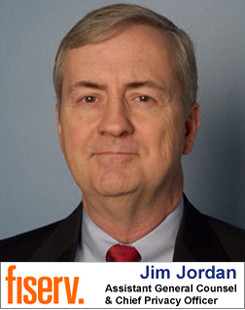
Working as the Assistant General Counsel for Privacy and Chief Privacy Officer of Fiserv, Jim Jordan says that his job is challenging and exciting, but still fits into the common denominator of his entire 20 year career. “I have always been explaining technology to lawyers and law to technology people,” he says.
Jim was born in Macon and went to schools there through high school. At the University of Georgia, where he was studying Physics, he was recruited into the U.S. Navy Nuclear Submarine program. He spent his senior year at UGA as an enlisted man and completed his degree. Then he spent four months attending Officer Candidate School in Newport, Rhode Island. His extensive nuclear submarine training program lasted two years including nuclear power school, nuclear prototype training and submarine school. It was 1981 before he reached Pearl Harbor ready to go to sea.
His first assignment was on a fast attack sub that could go as long as 90 days without surfacing. “My personal longest underwater was 55 days, though,” he said. “The underwater limiting factor is food. We could make our own water and air, but you had to go to port for food eventually.” After two and a half years at sea, Jim moved to submarine construction where he oversaw the building of the USS Georgia and the USS Alabama. Testing new submarines means taking them down 100 feet at a time and then looking for leaks. Finding none, you then go all the way down. How far down is that? “I’m pretty sure that’s still classified information,” Jim says.
In 1985, Jim decided to resign his commission and go to law school because he was interested in the law. But he believes that his experience in the military was great leadership training. “The best thing I learned, which I still live by today, is the you can delegate authority but you can’t delegate responsibility. I’m still responsible no matter how many people are working for me or with me.”
Jim had a partial scholarship from the law school at Georgia and together with the GI Bill, he and his wife settled in to law student life. He made law review where he worked as Articles Editor and also participated in mock trial competitions sponsored by the American Bar Association and the American Trial Lawyers Association. He wanted to be a litigator. Wanting to get in front of judges and juries quickly, he joined a boutique litigation practice fresh out of law school and later formed his own firm. In 1992, wanting a larger firm experience, Jim joined the Atlanta firm of Sutherland Asbill and then moved to Alston & Bird in 1994.
The change to Alston & Bird was more than a change of location. With his solid scientific background, Jim became an Intellectual Property attorney and later an internet/e-commerce attorney. He worked on a number of new issues for his clients at the time. Jim put in place the first email usage policies for a company, negotiated and rendered website development agreements, and handled a number of lawsuits regarding trademark issues pertaining to domain names. In a number of instances, even though a company had been operating under – and had trademarked – their company name, individuals and companies would “grad” their natural domain name for a nominal fee and then request millions of dollars to relinquish the rights so easily acquired. Jim’s domain name reclamation work included Waffle House, Bank of America and Nascar.com. He also did a lot of dot.com merger & acquisition work.
In 1999, Jim was asked to join GE as their first e-commerce attorney. Jack Welch had just announced that the company was totally committed to e-commerce and Jim thought that the work would be interesting. He set about doing all the legal work required to set GE on a path toward the e-commerce world. While successful in his work, it became apparent after five years or so that he would have to move from Atlanta to Stamford, Connecticut in order to keep advancing in the organization. When approached about a position in an Atlanta company, he was ready to listen.
Atlanta’s CheckFree knew that they needed a privacy officer and thought that Jim would be the perfect person for the role. He joined and three months later CheckFree merged with Fiserv to form a $5 billion financial software and technology services organization. Fiserv has over 500 product offerings today and 16,000 or more customers. It provides online bill pay services to 23 of the top 25 banks in the US and provides a number of other services that facilitate digital payments around the world. It is a trusted brand that some of the most valuable banking and financial services brands in the world trust and use.
After more than seven years, Jim is still excited about working at Fiserv and feels that the future is bright. “I get to work at the conjunction of law, e-commerce and technology,” says Jim, “and that’s the direction that the whole world continues to move.” Fiserv has just come up with two new products that are on the cutting edge of digital payments. SpotPay allows small merchants to accept payment via smartphones that is attached to an entire backend payments network and PotMoney is a new person to person payment systems for payments between individuals.
PREVIOUS NEWS